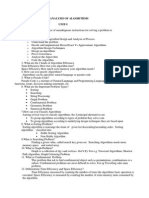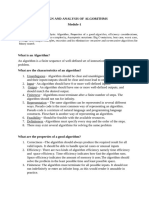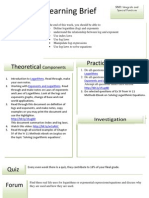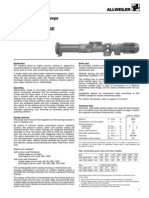0 ratings0% found this document useful (0 votes)
18 viewscalc 2
This document provides a review of essential topics from Algebra and Trigonometry necessary for Calculus, including functions, trigonometric functions, and exponential/logarithmic functions. It covers function notation, inverse functions, solving trigonometric equations, and the properties of exponential and logarithmic functions. The document emphasizes the importance of the unit circle and includes methods for solving equations both with and without calculators.
Uploaded by
bryan.russellCopyright
© © All Rights Reserved
Available Formats
Download as DOCX, PDF, TXT or read online on Scribd
0 ratings0% found this document useful (0 votes)
18 viewscalc 2
This document provides a review of essential topics from Algebra and Trigonometry necessary for Calculus, including functions, trigonometric functions, and exponential/logarithmic functions. It covers function notation, inverse functions, solving trigonometric equations, and the properties of exponential and logarithmic functions. The document emphasizes the importance of the unit circle and includes methods for solving equations both with and without calculators.
Uploaded by
bryan.russellCopyright
© © All Rights Reserved
Available Formats
Download as DOCX, PDF, TXT or read online on Scribd
You are on page 1/ 2
Calc 2
Review - In this chapter we give a brief review of selected topics from
Algebra and Trig that are vital to surviving a Calculus course. Included are
Functions, Trig Functions, Solving Trig Equations and Equations,
Exponential/Logarithm Functions and Solving Exponential/Logarithm
Equations.
Functions – In this section we will cover function notation/evaluation,
determining the domain and range of a function and function composition.
Inverse Functions – In this section we will define an inverse function and
the notation used for inverse functions. We will also discuss the process for
finding an inverse function.
Trig Functions – In this section we will give a quick review of trig functions.
We will cover the basic notation, relationship between the trig functions, the
right triangle definition of the trig functions. We will also cover evaluation of
trig functions as well as the unit circle (one of the most important ideas from
a trig class!) and how it can be used to evaluate trig functions.
Solving Trig Equations – In this section we will discuss how to solve trig
equations. The answers to the equations in this section will all be one of the
“standard” angles that most students have memorized after a trig class.
However, the process used here can be used for any answer regardless of it
being one of the standard angles or not.
Solving Trig Equations with Calculators, Part I – In this section we will
discuss solving trig equations when the answer will (generally) require the
use of a calculator (i.e. they aren’t one of the standard angles). Note
however, the process used here is identical to that for when the answer is
one of the standard angles. The only difference is that the answers in here
can be a little messy due to the need of a calculator. Included is a brief
discussion of inverse trig functions.
Solving Trig Equations with Calculators, Part II – In this section we will
continue our discussion of solving trig equations when a calculator is needed
to get the answer. The equations in this section tend to be a little trickier
than the "normal" trig equation and are not always covered in a trig class.
Exponential Functions – In this section we will discuss exponential
functions. We will cover the basic definition of an exponential function, the
natural exponential function, i.e. exex, as well as the properties and graphs
of exponential functions.
Logarithm Functions – In this section we will discuss logarithm functions,
evaluation of logarithms and their properties. We will discuss many of the
basic manipulations of logarithms that commonly occur in Calculus (and
higher) classes. Included is a discussion of the natural (ln(x)ln(x)) and
common logarithm (log(x)log(x)) as well as the change of base formula.
You might also like
- Design and Analysis of Algorithms 2 Marks and 16 MarksNo ratings yetDesign and Analysis of Algorithms 2 Marks and 16 Marks8 pages
- Lesson-1-Find-and-Solve-Problems-Involving-Trigono (1)No ratings yetLesson-1-Find-and-Solve-Problems-Involving-Trigono (1)8 pages
- HELM Workbook 5 Functions and ModellingNo ratings yetHELM Workbook 5 Functions and Modelling49 pages
- Inverse Trig Functions Integration Homework Answers100% (1)Inverse Trig Functions Integration Homework Answers7 pages
- Math For Social Sciences Final Finalpdf22No ratings yetMath For Social Sciences Final Finalpdf22507 pages
- Data Structures Using C by Vishal KushwahaNo ratings yetData Structures Using C by Vishal Kushwaha99 pages
- Cambridge IGCSE: Additional Mathematics 0606/23No ratings yetCambridge IGCSE: Additional Mathematics 0606/2316 pages
- Chapter 4 - Non-Uniform Flow in Open ChannelNo ratings yetChapter 4 - Non-Uniform Flow in Open Channel140 pages
- Design of Long Span Concrete Box Girder Bridges: Challenges and SolutionsNo ratings yetDesign of Long Span Concrete Box Girder Bridges: Challenges and Solutions11 pages
- Data Sheet For Three-Phase Squirrel-Cage-Motors SIMOTICS: Motor Type: SD100 FS: 286T - 4p - 30 HPNo ratings yetData Sheet For Three-Phase Squirrel-Cage-Motors SIMOTICS: Motor Type: SD100 FS: 286T - 4p - 30 HP5 pages
- Colligative Properties - Liquid SolutionsNo ratings yetColligative Properties - Liquid Solutions2 pages
- Monocrystalline Module: Maximum Power OutputNo ratings yetMonocrystalline Module: Maximum Power Output2 pages
- Chemistry HL - FAST FACTS - Second Edition - Pearson 2014No ratings yetChemistry HL - FAST FACTS - Second Edition - Pearson 201465 pages
- Cabella - Kamionkowski - Kamionkowski1997No ratings yetCabella - Kamionkowski - Kamionkowski199721 pages
- Holt Algebra 2 Homework and Practice Workbook Answers100% (1)Holt Algebra 2 Homework and Practice Workbook Answers4 pages
- Qorvo 5g Wireless Infrastructure Brochure PDFNo ratings yetQorvo 5g Wireless Infrastructure Brochure PDF4 pages
- Actual4Test: Actual4test - Actual Test Exam Dumps-Pass For IT Exams100% (1)Actual4Test: Actual4test - Actual Test Exam Dumps-Pass For IT Exams4 pages
- OCT Retiview 500 Optical Coherence Tomography: FeatureNo ratings yetOCT Retiview 500 Optical Coherence Tomography: Feature7 pages
- Improving Low-Frequency Noise in 14-Nm Finfet by Optimized High-K/Metal Gate Thermal ProcessingNo ratings yetImproving Low-Frequency Noise in 14-Nm Finfet by Optimized High-K/Metal Gate Thermal Processing4 pages

























































































